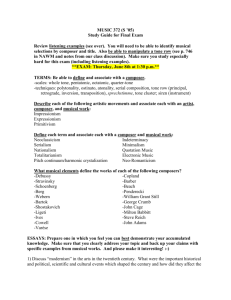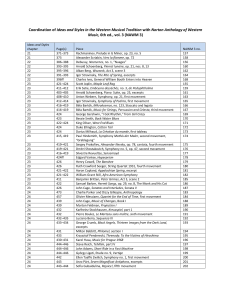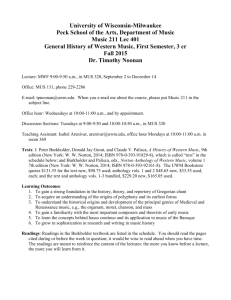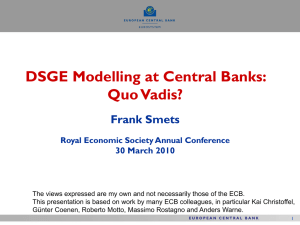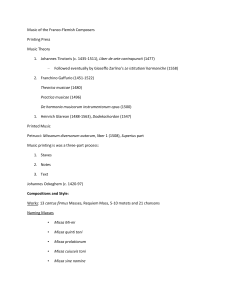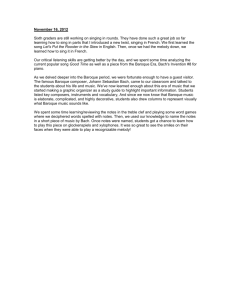MUSC 2050 Music History Survey I (3 credits) Fall 2012 • TTh • 2:00
advertisement
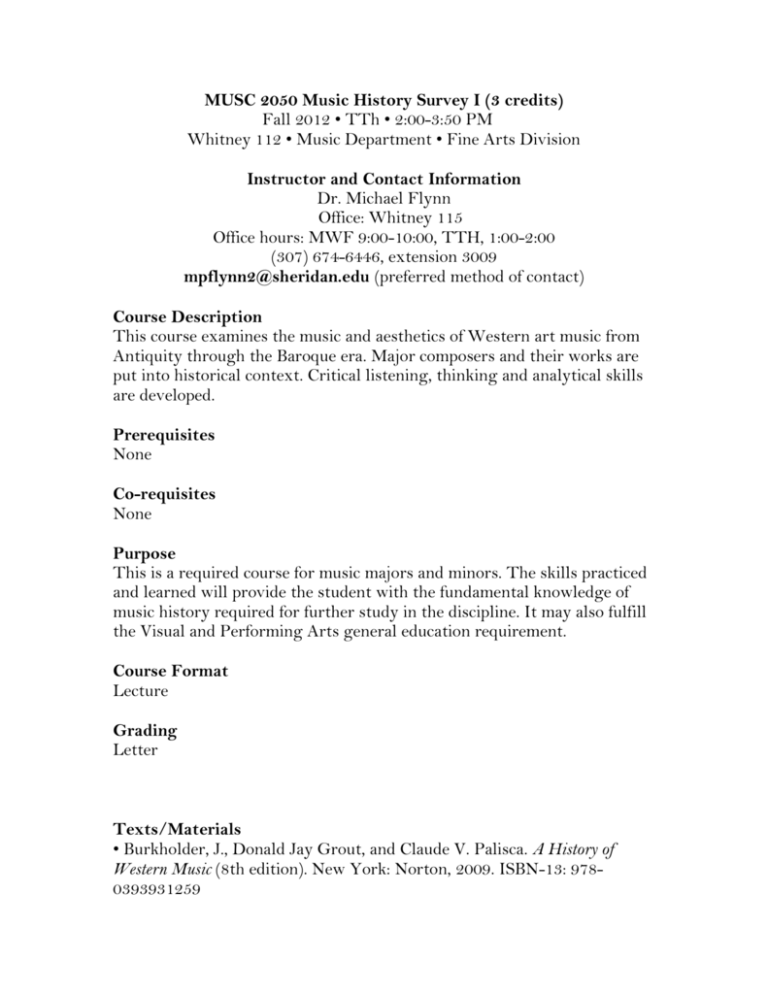
MUSC 2050 Music History Survey I (3 credits) Fall 2012 • TTh • 2:00-3:50 PM Whitney 112 • Music Department • Fine Arts Division Instructor and Contact Information Dr. Michael Flynn Office: Whitney 115 Office hours: MWF 9:00-10:00, TTH, 1:00-2:00 (307) 674-6446, extension 3009 mpflynn2@sheridan.edu (preferred method of contact) Course Description This course examines the music and aesthetics of Western art music from Antiquity through the Baroque era. Major composers and their works are put into historical context. Critical listening, thinking and analytical skills are developed. Prerequisites None Co-requisites None Purpose This is a required course for music majors and minors. The skills practiced and learned will provide the student with the fundamental knowledge of music history required for further study in the discipline. It may also fulfill the Visual and Performing Arts general education requirement. Course Format Lecture Grading Letter Texts/Materials • Burkholder, J., Donald Jay Grout, and Claude V. Palisca. A History of Western Music (8th edition). New York: Norton, 2009. ISBN-13: 9780393931259 • Burkholder, J., Donald Jay Grout, and Claude V. Palisca. Norton Anthology of Western Music, Volume 1 (6th edition). New York: Norton, 2009. ISBN-13: 978-0393931266 • Dickreiter, Michael. Score Reading: A Key to the Music Experience. Pompton Plains, NJ: Amadeus Press, 2003. ISBN-13: 978-1574670561 • Pens, pencils, erasers, notebook, etc. • Access to a computer with an internet connection and a browser, or equipped with a CD-ROM drive and media player software that can play AAC audio files (e.g. iTunes) • USB flash drive (2GB or larger) Minimum Student Outcomes Upon completion of MUSC 2050 Music History Survey I, the student will: • identify major composers, genres and works associated with stylistic periods studied. • summarize the musical aesthetics of each stylistic period studied. • apply knowledge of musical stylistic content to identify musical excerpts both visually from scores and aurally from recordings or performances. • distinguish musical works based on personal stylistic traits of individual composers. • Approximate Final Grade Evaluation • Approximate Final Grade Evaluation 40% — Unit Exams 20% — Historical Period Outline Summaries 15% — Roundtable Assignments/Participation 15% — Quick Quizzes 10% — Research Paper Descriptions of Graded Course Components Unit Exams: [Four total, each worth around 10% of your final grade] Four unit exams will be administered at regular periodic intervals throughout the semester. Exams may cover any material from the text, handouts, class activities, videos, assignments, and lectures. Please make immediate note of exam days on our attached course schedule and resolve any conflicts you may have ASAP. Historical Period Outline Summaries: [4 total, each worth 5% of your final grade] Students will assemble outline summaries of each historical period that will be suitable for later use as study aids for upper-level coursework, exit exams, or even graduate entrance exams. Roundtable Assignments: [Each assignment worth around 1% of your final grade] This component may researching composer biographies, reading historical source documents, viewing films, and answering critical thinking questions. Assignments will be prepared outside of class, then reviewed in a roundtable, seminar-style format during the next meeting. Students will be graded on both preparedness and participation in the roundtable. Quick Quizzes: [periodic, each worth around 2% of your final grade] Short timed quizzes based on the prior meeting’s reading assignment will be periodically administered during the first five minutes of class meetings (except for exam days). These quizzes cannot be made up, and they will be collected at five minutes after the hour. Therefore, please be consistently punctual for our meetings. Research Paper: [Worth 10% of your final grade] A traditional historical research paper will be assigned. Guidelines for subject matter, formatting, and annotations will be distributed early in the semester. Attendance & Participation: While not directly factored into your grade (with the exception of the roundtable activities described above), attendance and participation are vital to learning. Students are expected to attend class regularly, arrive on time, and stay for the entire session. Students are also expected to answer homework discussions when called on. Excessive unsatisfactory responses or unwillingness to participate may result in a penalty applied to your homework grade. Likewise, consistent correct responses and regular participation may be awarded bonus points in the case of borderline grades at the end of the semester. You are responsible for learning all material covered in class whether you are present or not. If you do miss a meeting or a portion of one, please ask a classmate if you may review his or her notes. Course Websites You have several online resources available to you. Our class companion website for this course is available at sheridancollegemusic.com. Here you’ll find printable documents (such as the syllabus and other handouts), links to useful sites, and audio files. The second site is a text-specific companion website that includes flashcards and tutorial quizzes for each chapter, along with other useful links. A link to this site can be found on our class webpage, or by typing this shortcut into your browser: http://mcaf.ee/toi38. Finally, our library subscribes to the Naxos streaming music library. You can access thousands of art music recordings through this site. Late and Incomplete Assignments Students are expected to complete all assignments by prescribed due dates. The “due date” is the beginning of the meeting following an assignment unless otherwise noted on the course calendar. Assignments submitted after the due date will be assessed a flat 25% penalty. I will accept late work up until the final day of class, so do not simply “blow off” an assignment because the due date has passed and the work is subject to a late penalty. Remember, partial credit is always better than no credit at all. Absences and Make-up Policy In cases of school-sponsored activities or illness resulting in an absence by the student, it is the student’s responsibility to notify the instructor in advance of the missed class. Absences with advance notice are considered “excused.” Students are responsible for all reading, listening and other homework assigned during the absence. Absences without prior notification to the instructor (“unexcused”) will automatically result in forfeiture of any possible points associated with the missed class. Quick Quizzes are exempt from this policy as they must be completed in class and cannot be made up or taken in advance. Course Withdrawal/Petition for Incomplete Grade On occasion, unforeseen circumstances may interfere with a student’s ability to complete a course or to accomplish a satisfactory level of personal academic achievement. If you find yourself in this situation, I encourage you to visit with me to evaluate your options. Rarely is a grade unsalvageable if a student is willing to take the steps necessary to rectify it. If, however, a student is ever unable to fully devote his or her energies to the coursework, withdrawal may be the best option. Consult the college’s academic calendar for the withdrawal deadline. Paperwork for withdrawals can be obtained from the Office of Records and Admissions. A temporary grade of “I” or “incomplete” is available to students who cannot finish the course due to an emergency situation that arises late in the semester. The administration of an incomplete is at the instructor’s discretion. Although I can be flexible depending on the circumstances of the student, my general policy is that the student should have at least 75% of the course completed and have a current grade of C or better at the time of the request for the incomplete grade. The incomplete portion of the course must be completed by the end of the semester following the request (summer sessions excluded) or the “I” will revert to an “F.” Northern Wyoming Community College District Policies Academic Honesty Statement: Students are expected to maintain the highest standards of academic honesty and integrity. Academic honesty means performing all academic work without lying, cheating, deceit, plagiarism, misrepresentation, or unfairly gaining advantage over any other student. Violations of academic honesty are in violation of District standards for student conduct and shall result in disciplinary action. Disability Statement: Students with disabilities who believe they may need accommodations in this class are encouraged to contact the Student Success Center as soon as possible to ensure such accommodations may be implemented. A complete list of official college policies can be found on the NWCCD website by pointing your browser to this shortcut: mcaf.ee/7018c Course Calendar Subject to revision. All graded assignments are due at beginning of the next class meeting unless otherwise noted. Quick Quizzes are over the previous day’s assigned reading. Graded items in bold. Anthology Key: HAM = Historical Anthology of Music; MWC = Music in Western Civilization; NAWM = Norton Anthology of Western Music. (Note: I will distribute in-class copies of any scores assigned from sources outside of your anthology.) Meeting 1, August 27 • Topics: Syllabus formalities; What is “Art” Music?; Historical Timeline of “Art” Music • Reading: SR (Score Reading): “Introduction,” pp. 7-9 -------------------------------------------------------------------------------------------------------------------------------------Meeting 2, August 29 • Topics: Quick Quiz 1 (over Score Reading reading assignment); Music of Antiquity • Reading: HWM (History of Western Music): Chapter 1 • Listening: “Epitaph of Seikilos” (NAWM 1); “First Delphic Hymn” (HAM 7a); Stasimon Chorus (NAWM 2); Hebrew Examples (cantillation examples [audio only] and HAM 6 [score only]) -----------------------------------------------------Meeting 3, September 3 • Topics: Student Reports on Source Readings from Antiquity; A Crash Course on Ancient Greek Art; Group Activity: Introduction to Historical Period Summaries – Examples – hand out sheet to fill out in class • Reading: SR: “Types of Scores,” pp. 11-15 / FIND and WATCH Medieval Art and Music FILM (Part 1) and take notes for participation in group discussion (grade) -------------------------------------------------------------------------------------------------------------------------------------Meeting 4, September 5 • Topics: Quick Quiz 2; Introduction to the Middle Ages; Roundtable: Medieval Art & Music Film (Part 1) Discussion • Reading: HWM: Chapter 2 (pp. 22-33 up to “The Development of Notation”) ------------------------------------------------------Meeting 5, September 10 • Topics: Elements of Gregorian Chant; Modes • Reading: HWM: Chapter 2 (pp. 33-46) • Listening: Mass for Christmas Day (NAWM 3); Chants from Vespers for Christmas Day (NAWM 4) -------------------------------------------------------------------------------------------------------------------------------------Meeting 6, September 12 • Topics: Functions and Forms of Chant; Composer & Theorist Reports; Research Paper Guidelines • Reading: HWM: Chapter 3; SR: “Scores and Their History,” pp.41-46 • Listening: Gradual, Haec dies (HAM 12); Sequence, Victimae paschali laudes (NAWM 5); Tropes on Puer natus (NAWM 6) -----------------------------------------------------Meeting 7, September 17 • Topics: Quick Quiz 3; Secular Song and Dance in the Middle Ages • Reading: HWM: Chapter 4 • Listening: Canso, “Can vei la louzeta mover” (NAWM 8); “Robins m’aime” from Jeu de Robin et de Marion (NAWM 10); Palästinalied (NAWM 11); “Der Gülden Ton” (HAM 24 [score only]); “A tutta gente” (HAM 21b [score only]; “Mais no faz” (HAM 22b [score only]); “Worldes blis” (HAM 23b) -------------------------------------------------------------------------------------------------------------------------------------Meeting 8, September 19 • Topics: Exam over Antiquity and the Early Middle Ages; Early Middle Ages Outline Summary DUE! -----------------------------------------------------Meeting 9, September 24 • Topics: Early Polyphony • Reading: HWM: Chapter 5 (pp. 84-89 up to “Aquitanian Polyphony”); SR: “Methods for Following a Score: Following a Single Part,” pp. 65-70 • Listening: Organa from Musica enchiriadis (NAWM 14); Viderunt Hemanuel: (MWC 18) -------------------------------------------------------------------------------------------------------------------------------------Meeting 10, September 26 • Topics: Quick Quiz 4; Medieval Art & Music Film (Part 2) Discussion; Ars Antiqua, Part 1; Paper General Topic Due (verbal) • Reading: HWM: Chapter 5 (pp. 89-101 up to “Polyphonic Conductus”) • Listening: Leoninus, Viderunt omnes (NAWM 17); Substitute clausula (NAWM 18); Perotinus, Viderunt omnes (NAWM 19) -----------------------------------------------------Meeting 11, October 1 • Topics: Roundtable: Source Readings from the Middle Ages; Ars Antiqua, Part 2 • Reading: HWM: Chapter 5 (pp. 101-110); SR: “Methods for Following a Score: Chamber Music,” pp. 70-73 • Listening: Conductus, Orientis partibus (MWC 21); Conductus, Ave virgo virginum (NAWM 20); Motets on Tenor Dominus (NAWM 21); Franconian motet, On parole de batre (MWC 25) -------------------------------------------------------------------------------------------------------------------------------------Meeting 12, October 3 • Topics: Quick Quiz 5; Roundtable: Composer/Theorist Reports; The Fourteenth Century: The Ars Nova in France • Reading: HWM: Chapter 6 (pp. 113-133 up to “Italian Trecento Music”) • Listening: Philippe de Vitry, In arboris, etc. (NAWM 24); Philippus de Caserta, En remirant vo douce pourtraiture (NAWM 28); Machaut, Ma fin est mon... (Handout [score only]); Machaut, Foy porter (NAWM 26); Machaut, Kyrie, Le Messe de Nostre Dame (NAWM 25) ------------------------------------------------------ Meeting 13, October 8 • Topics: The Fourteenth Century: The Trecento; Instrument Reports; Dance Music of the Late Middle Ages; Specific Paper Topic Due (verbal) • Reading: HWM: Chapter 6 (pp. 133-143) • Listening: Jacopo da Bologna, Non al suo amante (NAWM 29); Gherardello da Firenze, Tosto che l’alba (NAWM 30); Landini, Non arvà ma’ pietà (NAWM 31); La quarte estampie royal (NAWM 13); Keyboard estampie (MWC 30); 13th-Century Dances (HAM 40-41 [score only]) -------------------------------------------------------------------------------------------------------------------------------------Meeting 14, October 10 • Topics: Exam over the Later Middle Ages; Late Middle Ages Outline Summary DUE! ------------------------------------------------------ Meeting 15, October 15 • Topics: Introduction to the Renaissance; English Music of the Fifteenth Century; Paper Topic Sentence Due (e-mail) • Reading: HWM: Chapter 5 (pp. 111-112); Chapter 7; Chapter 8 (pp. 167175 up to “Music in the Burgundian Lands”) • Listening: Anonymous rota c. 1250, Sumer is icumen in (NAWM 23); Dunstable, Quam pulchra es (NAWM 33); Anonymous, Agincourt Carol (MWC 41) -------------------------------------------------------------------------------------------------------------------------------------Meeting 16, October 17 • Topics: The Fifteenth Century: Burgundian and Franco-Flemish Music • Reading: HWM: Chapter 8 (pp. 175-190); Chapter 9 • Listening: Anonymous tune, L’Homme armé (MWC 45a); Dufay, Kyrie from Missa L’Homme armé (MWC 45b); Binchois, Dueil angoisseus (MWC 43); Josquin, Ave Maria...virgo serena (NAWM 41); Josquin, Guillaume se va chaufer (MWC 48) ---------------------------------Meeting 17, October 22 • Topics: Renaissance Art & Music Film Discussion; The Sixteenth Century, Part 1: Musical Developments; Roman Catholic Music • Reading: HWM: Chapter 10 (pp. 225-236 up to “Germany and Eastern Europe”); SR: “Renaissance and Baroque Scores,” pp. 46-51 • Listening: Palestrina, Pope Marcellus Mass, Credo (NAWM 47); Victoria, Motet: O magnum mysterium (NAWM 48a); Victoria, Missa O magnum mysterium, Kyrie (NAWM 48b) -----------------------------------------------------Meeting 18, October 24 • Topics: Quick Quiz 6; Roundtable: Source Readings from the Renaissance and Composer and Theorist Reports; Paper First Paragraph Due (e-mail); The Sixteenth Century, Part 2: Reformation Music in Germany, France and England • Reading: HWM: Chapter 10 (pp. 211-225 up to “Catholic Church Music”); SR: “Methods for Following a Score: Counting Beats,” pp. 73-76 • Listening: Luther, Chorales (NAWM 44); Bourgeois, Psalm 134; (NAWM 45); Byrd, Sing joyfully unto God (NAWM 46); Gibbons, This is the record of John (HAM 172) ------------------------------------------------------------------------------------------------------------------------------------- Meeting 19, October 29 • Topics: Quick Quiz 7; The Sixteenth Century, Part 3: Secular Vocal Music • Reading: HWM: Chapter 11 • Listening: Arcadelt, Il bianco e dolce cigno (NAWM 52); Josquin, El grillo è bon cantore (MWC 55); Sermisy, Tant que vivray (NAWM 56); Weelkes, As Vesta Was (NAWM 60); Morley, My bonnie lass she smileth (NAWM 59); Henry VIII, Pastyme with Good Companye (MWC 71); Dowland, Flow my tears (NAWM 61) -----------------------------------------------------Meeting 20, October 31 • Topics: Roundtable: Instrument and Dance Reports; Lecture: Instrumental Music of the Renaissance • Reading: HWM: Chapter 12 (pp. 264-281 up to “Music in Venice”) • Listening: Sermisy, Tant que vivray (arranged for lute [MWC 60b] and for keyboard [MWC 60d]; Isaac, La Spagna (MWC 52); Gervaise, Pavana y Gallarda d’Angleterre (HAM 137); Hofhaimer, Salve, Regina (MWC 65); Narvaez, Excerpts from Los seys libros del Delphin; NAWM 63 -------------------------------------------------------------------------------------------------------------------------------------Meeting 21, November 5 • Topics: Exam over the Renaissance; Renaissance Outline Summary DUE! ------------------------------------------------------ Meeting 22, November 7 • Topics: Introduction to the Baroque; Birth of Opera • Reading: Chapter 13; Chapter 14 (pp. 307-320 up to “Spread of Italian Opera”) • Listening: Monteverdi, Cruda Amarilli (NAWM 66); Peri, Euridice, “Funeste piagge” (MWC 79); Monteverdi, selections, Orfeo (MWC 81, NAWM 69) -------------------------------------------------------------------------------------------------------------------------------------Meeting 23, November 12 • Topics: Baroque Opera, continued • Reading: Chapter 14 (pp. 320-328); Chapter 16 (pp. 358-364 up to “Performance practice”; pp. 373-376 up to “Other English Music”); Chapter 19 (pp. 454-464 up to “Oratorios”) • Listening: Cesti, excerpt from Orontea (NAWM 71); Purcell, conclusion of Dido and Aeneas (NAWM 86); Handel, excerpt from Giulio Ceasare (NAWM 99) -----------------------------------------------------Meeting 24, November 14 • Topics: Baroque Vocal Music, Part 1; Paper Rough Draft Due • Reading: Chapter 12 (pp. 281-285); Chapter 15 (pp. 329-334 up to “Catholic Sacred Music”)’ Chapter 16 (pp. 376-377 “Other English Music”) • Listening: Caccini, Filli, mirando i cielo (MWC 80); Catch: “My Man John” (Handout); Strozzi, Lagrime mie (NAWM 72); Purcell, Selections from Come, ye sons of art (MWC 107); Gabrieli, In ecclesiis (NAWM 74) -------------------------------------------------------------------------------------------------------------------------------------Meeting 25, November 19 • Topics: Baroque Vocal Music, Part 2 • Reading: Chapter 15 (pp. 334-343); Chapter 19 (pp. 439-442 up to “Organ Music,” pp. 448-453 up to “Bach’s Synthesis,” pp. 460-464 up to “Instrumental Works”) • Listening: Schutz, Saul, was vergolgst du mich from Symphoniae sacrae III (NAWM 78); Bach, Nun komm, der Heiden Heiland (NAWM 98); Handel, selections from Messiah (handout) ------------------------------------------------------ • Thanksgiving Break, November 22; No Class Meeting -------------------------------------------------------------------------------------------------------------------------------------- Meeting 26, November 21 • Topics: Student Instrument Reports; Baroque Instrumental Music: Keyboard Music • Reading: Chapter 15 (pp. 344-353 up to “Tradition and Innovation”; 367372; 404-409 up to “Other Instrumental Music”; 442-446 up to “Chamber Music”) • Listening: Bach, “Erbarme dich, mein Gott” from St. Matthew Passion (Access online: Naxos call no. C60046-2, Disc 2, Track 4); Bach, Prelude on Durch Adams (NAWM 97); Bach, Prelude and Fugue in A Minor (NAWM 96); Bach, WTC, Fugue in C Minor (MWC 114); Jacquet de la Guerre: Suite in A Minor from Pièces de clavecin (NAWM 85) ------------------------------------------------------ Meeting 27, November 26 • Topics: Quick Quiz 8; Baroque Art & Music Film Discussion; Lecture: Baroque Instrumental Music: Chamber Music • Reading: Review Chapter 15 (pp. 350-351 up to “Settings of Existing Melodies”; Chapter 17 (pp. 390-396 up to “The Concerto”) • Listening: Biber, Sonata No. 11 (“Resurrection”) (MWC 97); Corelli, Trio Sonata, Op. 3, No. 2 (NAWM 91); Gaultier, Courante from La Coquette virtuose (NAWM 84) -------------------------------------------------------------------------------------------------------------------------------------Meeting 28, December 3 • Topics: Roundtable: Source Readings from the Baroque; Lecture: Baroque Orchestral Music, Part 1— The Concerto and Antonio Vivaldi • Reading: Chapter 17 (pp. 396-399 up to “Germany and Austria”); Chapter 18 (pp. 420-427 up to “Music in France”) • Listening: Torelli, Trumpet Sinfonia in D Major (MWC 94); Vivaldi, Concerto in A Minor from L’estro armonico, Opus 3, No. 6 (NAWM 93) -----------------------------------------------------Meeting 29, December 5 • Topics: Baroque Orchestral Music, Part 3—The French Overture, Suite, and George Frederic Handel; Paper Final Draft Due • Reading: Chapter 16 (pp. 358-366 up to “Song and Cantata”); Chapter 19 (pp. 454-455 up to “Operas” and pp. 464-467) • Listening: Lully, Overture to Armide (NAWM 82a); Handel, Water Music, Suite No. 1 (MWC 109) • Topics: Baroque Orchestral Music, Part 3—The French Overture, Suite, and George Frederic Handel; Paper Final Draft Due • Topics: Baroque Orchestral Music, Part 1—The Concerto Grosso and Johann Sebastian Bach • Reading: Chapter 19 (pp. 447-448 up to “Cantatas”) • Listening: Bach, Brandenberg Concerto No. 5 in D Major, I (MWC 115) ------------------------------------------------------ Meeting 31, Finals Week • Final Papers Due – FINAL EXAM OVER THE BAROQUE — Baroque Outline Summary DUE!
